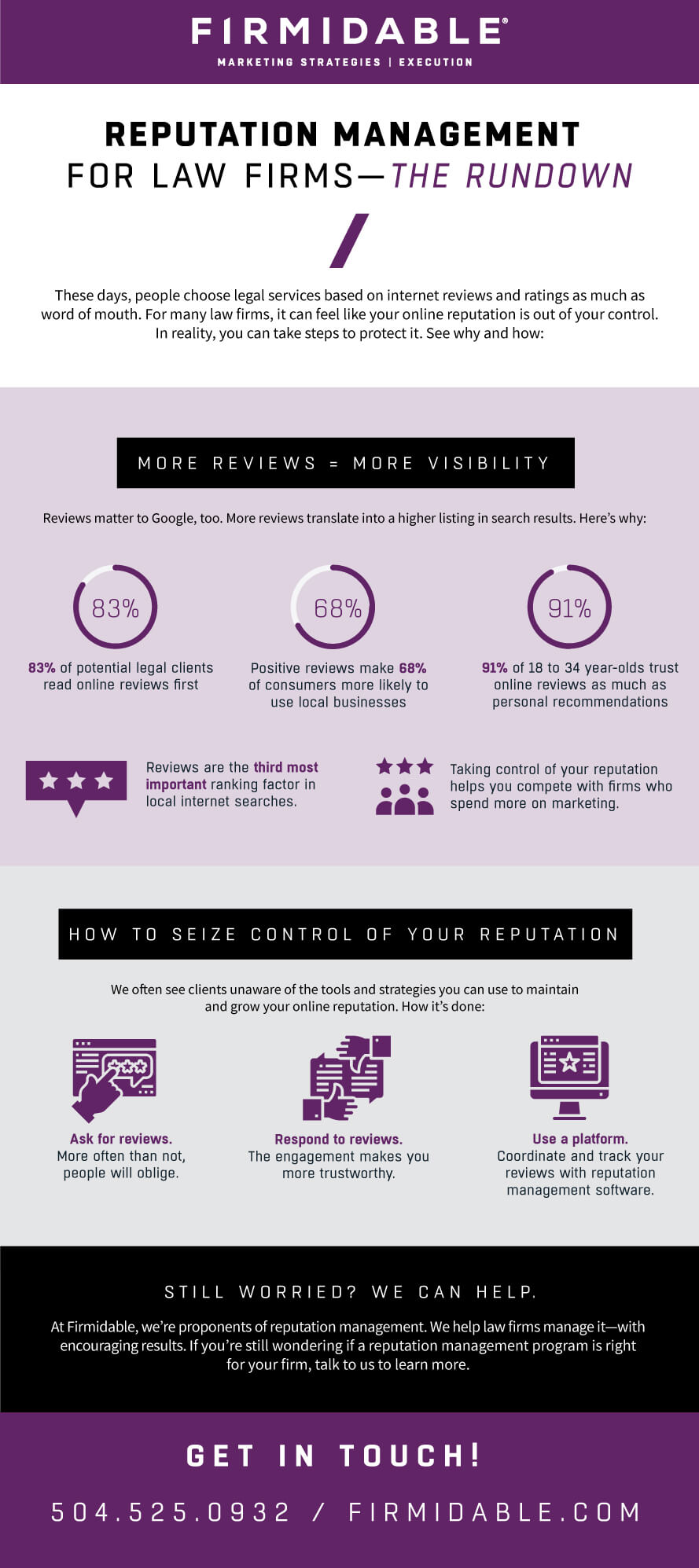Reputation Management: How to Protect Your Law Firm’s Online Image

But how do you even find what everybody’s saying about you on the internet?
You need a strategy for online reputation management.
It sounds like digital marketing jargon, but done correctly, reputation management is a savvy, systematic way to improve your firm’s image and caseload.
Chris Jewell, who oversees Firmidable’s reputation management program for law firms, said it can be tough for attorneys to get a full picture of their online profiles.
Outside of the big hitters—Google, Facebook and Yelp—your firm can pop up on a lot of websites that provide user reviews, including specialized rating sites for attorneys like Avvo, Lawyers.com, FindLaw and more.
“Your firm is on sites you don’t even know you have a listing on,” Jewell said. “It’s hard to monitor when you don’t even know you’re there. But it matters.”
It matters because reputation management isn’t just a sideline to your main legal marketing efforts. A smart approach can turn your online ratings into a tool for attracting more clients and cases.
In this post, we’ll explain:
- Why it’s better to have more online reviews.
- How to get more reviews.
- How to find opportunity in negative reviews.
Having More Lawyer Reviews Makes You More Visible Online
Many of your clients are coming to you in dire situations. Their lives have gone awry. They need legal help. Choosing an attorney is a momentous decision. They’re looking for reassurance.
So it’s no surprise that statistics show online reviews are holding more and more weight in clients’ decision-making.
For example:
- According to a study by Birdeye, which provides reputation management services, 83% of potential legal clients read online reviews as their first step in finding an attorney. And 90% of clients choose a law firm that appears on page 1 of search results.
- An analysis from BrightLocal, a search engine optimization (SEO) firm, showed positive reviews make 68% of consumers more likely to use local businesses.
- BrightLocal also found an astounding 91% of 18- to 34-year-olds trust online reviews as much as personal recommendations.
- The SEO firm Moz concluded that reviews are the third most important ranking factor in local internet searches, which is a crucial arena for many law firms. That makes reviews more important than referrals from social media or other websites.
To synthesize that: Having more reviews—especially good ones—not only makes your firm look good, it helps more people find your firm in the first place.
And then many of your potential clients will be reading, and trusting, whatever people are saying about you in the reviews—for better or worse.
If your strategy for managing reviews isn’t solid, you risk losing out on case leads.
Because so many young people trust reviews, this trend isn’t going away anytime soon.

RELATED
Getting Better Online Lawyer Reviews
Managing Your Online Reputation: How to Encourage More Reviews
Gary Sells, a New Orleans Social Security Disability advocate, knew he cared about his online reputation, but didn’t exactly know what to do about it.
“I did not recognize the importance of reputation management” as a strategic program, he said. But, he said, “I was concerned about online reviews. Now I know I can control them somewhat. That is comforting.”
With Firmidable’s help, Sells uses a reputation management system that combines all his online reviews into one platform—so he can quickly and easily see what reviews people are writing about him.
He can respond to many of the reviews directly from the platform. He can also use the software to request reviews from clients after he wins their cases.
There’s no shame in asking for reviews. The key to doing it honestly and ethically is to avoid leading clients about exactly what to say. Simply make a polite request for a review and leave it at that.
People may be more open to giving you a review than you think.
The Birdeye study found seven out of 10 clients will leave a review of your firm when asked.
“People are always willing to do a review, but actually getting them to do it is another thing,” Sells said.
Following this process has made a huge difference for him.
He’s been using a disciplined online reputation management approach since October. He’s seen his total number of reviews triple, which has led to more clients calling his office.
“I have had a couple of potential clients say they called because the reviews were positive,” Sells said. “I think the reviews prompt people to take a second look at the website and then feel more comfortable.”
From February 2015 to October 2018, Sells only had 10 total reviews across multiple sites.
Since October alone, he’s built the number up to 30 using his reputation management dashboard.
Turning Your Responses into Another Chance to Sell Your Firm
Sometimes, even a negative review can become a positive for your firm.
If all your reviews are glowing, it can raise suspicions that they aren’t real. An occasional negative review, ironically, increases the credibility of the good reviews by signaling authenticity.
But if your firm has negative reviews floating around on the internet unanswered, that can hurt you.
An empathetic response to somebody saying they had a bad experience with your firm—and an apology—can make you look even more impressive than a routine good review.
Your professional, concerned tone projects that you listen to and care about clients. You don’t run away from criticism. Your respectful response casts doubt for other readers about the seriousness of the negative reviewer’s story.
The reviewer may even change their tone and upgrade your rating.
You can also use your response to highlight something positive about your firm, your mission and the caliber of service you strive to provide, allowing you to insert a subtle pitch for hiring you in this seemingly unlikely place.
“When they leave a review, it helps your business, even if the review is sometimes bad,” Jewell said. “Responses matter. It shows engagement. It shows you care. It helps you stand out from your competitors. And it’s still boosting your SEO.”
As a side benefit, a critical reviewer might occasionally call your attention to an area where you can improve your firm.
Online Reputation Management Can Help You Compete with Bigger Firms
There’s another benefit to having a sophisticated approach to managing your lawyer reviews: It’s a great equalizer.
The internet doesn’t necessarily care if your law firm has two lawyers or 200. You’re just a listing, with a collection of contact information, content, links, search rankings and reviews.
“It can be a huge—and cost effective—boon for smaller firms looking to compete with the big players,” Jewell said. “It also means the big players need to be cognizant of their own online reputations.”
At our legal marketing firm, we hear from lawyers all the time who worry their competitors are outsmarting them in their digital marketing.
Reputation management is a way to gain an edge over other firms in your market—and win the trust of new clients.
If you want to know more about how online reputation management can give your law firm a boost, CONTACT FIRMIDABLE TODAY.
Firmidable has been a national expert in legal marketing for almost 30 years. It brings law firms customized, data-driven marketing strategies and services, including online and traditional media for a wide range of legal practices. From Maine to Hawaii, it has transformed the lives of attorneys—and their clients.

